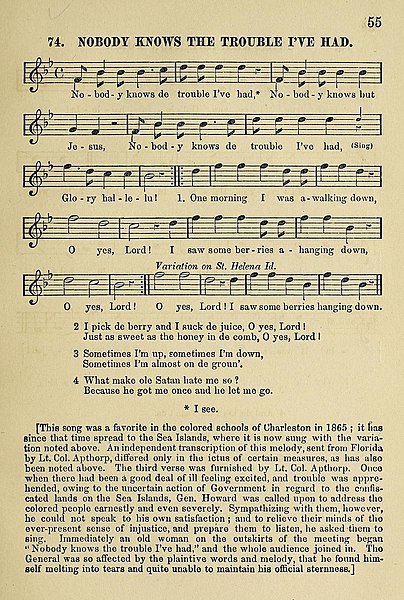
When We Remembered Zion
The great theologian Dr. H. Beecher Hicks, Jr., regarding the captivity of the Israelites in Psalm 137, suggests: "The oppressors required something that was of great value from the oppressed, only to make a mockery of their religion." "Sing us one of those songs of Zion!" they asked. Having already tossed their instruments aside, the Israelites knew the songs would require the innermost thoughts and expressions of the mind, body, and spirit. Therefore, they wept when they remembered Zion. Even though the music was a functional and integral element of African culture, Europeans often viewed traditional West African music as "primitive" and "barbaric." Its intricately woven melodies and harmonies and multi-linear polyrhythms were far too complex for them to decipher. In Garrison, Ware, and Allen's attempt to transcribe The Slave Songs of the United States, they conceded: "The best we can do will convey but a faint shadow of the original" (Allen, Ware, and Garrison 1867, iv.-vi.).
However, what appeared to be savage to the Europeans was of great value to the African people. Through this peculiar form of artistic expression, Africans confirmed their identity, venerated their spirituality, and strengthened their sense of community. Therefore, it was not of necessity to require "a song" from the enslaved African in America. The unmitigated truth is, they needed it themselves. Without their music, they would have never survived the treacherous institution of slavery.
Organically composed from toil and tribulation, this folk musicSongs that identify a specific ethnic group of people.-the music created by, and identifying a specific group of people-retained the spirituality, mysticism, and symbolism of African cultural beliefs and practices. Wayman McLaughlin, an early African American philosopher, provides a wealth of resources in his publication, "Symbolism and Mysticism in the Spirituals." He points to symbolism as an outward sign of an inward meaning (McLaughlin 1963, 69). One such example of this claim is found in the verse of the spiritual "Steal Away to Jesus."
Steal Away to Jesus
My Lord, He calls me. He calls me by the thunder.
The Trumpet sounds within my soul.
I ain't got long to stay here.
Traditional
'The trumpet symbolizes a call to attention-an announcement of sorts. To the slave, however, this trumpet is a clear representation of freedom. There is a great deal of symbolism in this passage. The slave knew that his best opportunity at gaining freedom would be when it rained, and the words "My Lord calls me by the thunder" imply a connection between the two events (rain and thunder). For then, the hound dogs could not trace their scent.
McLaughlin quotes from a book by Erich Fromm titled The Forgotten Language. In it, Fromm remarks: "Symbolic thinking represents the very substance of the psychic life...Symbolic language is language in which the world outside is a symbol of the world inside, a symbol for our souls and minds" (Fromm as cited in McLaughlin 1951, 12). McLaughlin then considers the relationship between symbolic language and mystical meaning. He states that the term "mysticism" derives from the mystery religion in Greece and meant a person had secretly entered a hidden truth. He writes, "With the influence of Neo-Platonism and Christian tradition, mysticism makes the claim of being an intuitive experience, that is, in direct communion with God." (1963, 69). In like manner, Henri Bergson writes in The Two Sources of Morality and Religion: "When the darkest depths of the soul are stirred, what rises to the surface and attains consciousness takes on there an image or an emotion...The image becomes symbolic of what is about to happen… The soul ceases to revolve around itself. It feels an indefinable presence, or divines through a symbolic vision. Then comes an enthralling rapture. God is there, and the soul is in God" (Bergson as cited in McLaughlin 1954, 239). For instance, the lines in the spiritual, "Wade in the Water," "God's gonna trouble the water" create a profound image that leads to a spiritual connection between God and the listeners, the enslaved Africans. God troubles the water to protect them in any circumstance.
Take a listen to these videos "Po Mourners got a Home at Las'" and "We Are Climbing Jacob's Ladder:"

Po' Mourners got a Home at Las'
Negro Spiritual

We Are Climbing Jacob's Ladder
Emotional Song of the Civil War Era
Dr. H. Beecher Hicks, Jr.
The oppressors required something that was of great value from the oppressed, only to make a mockery of their religion.
Steal Away to Jesus
My Lord, He calls me. He calls me by the thunder. The Trumpet sounds within my soul. I ain't got long to stay here.






